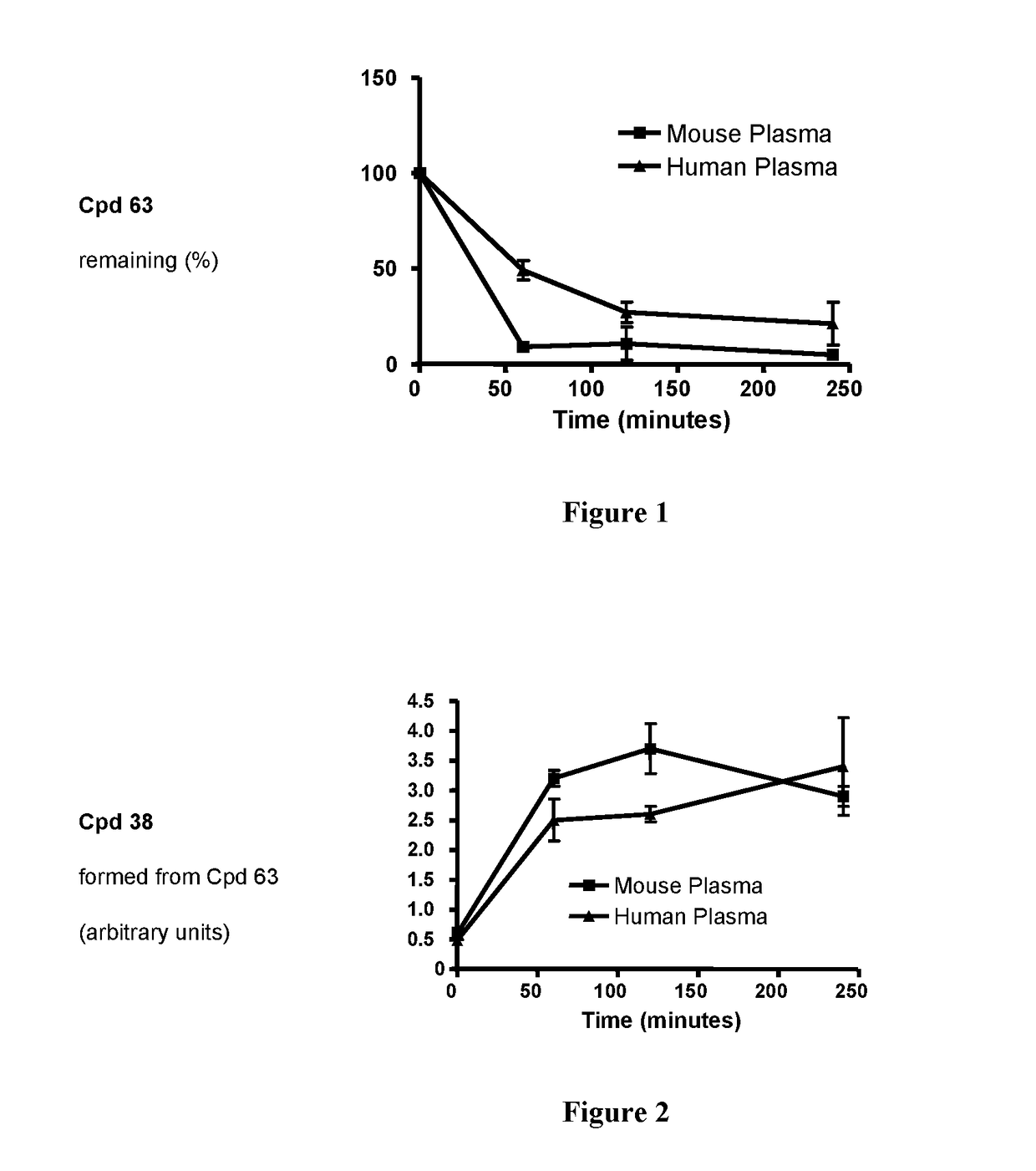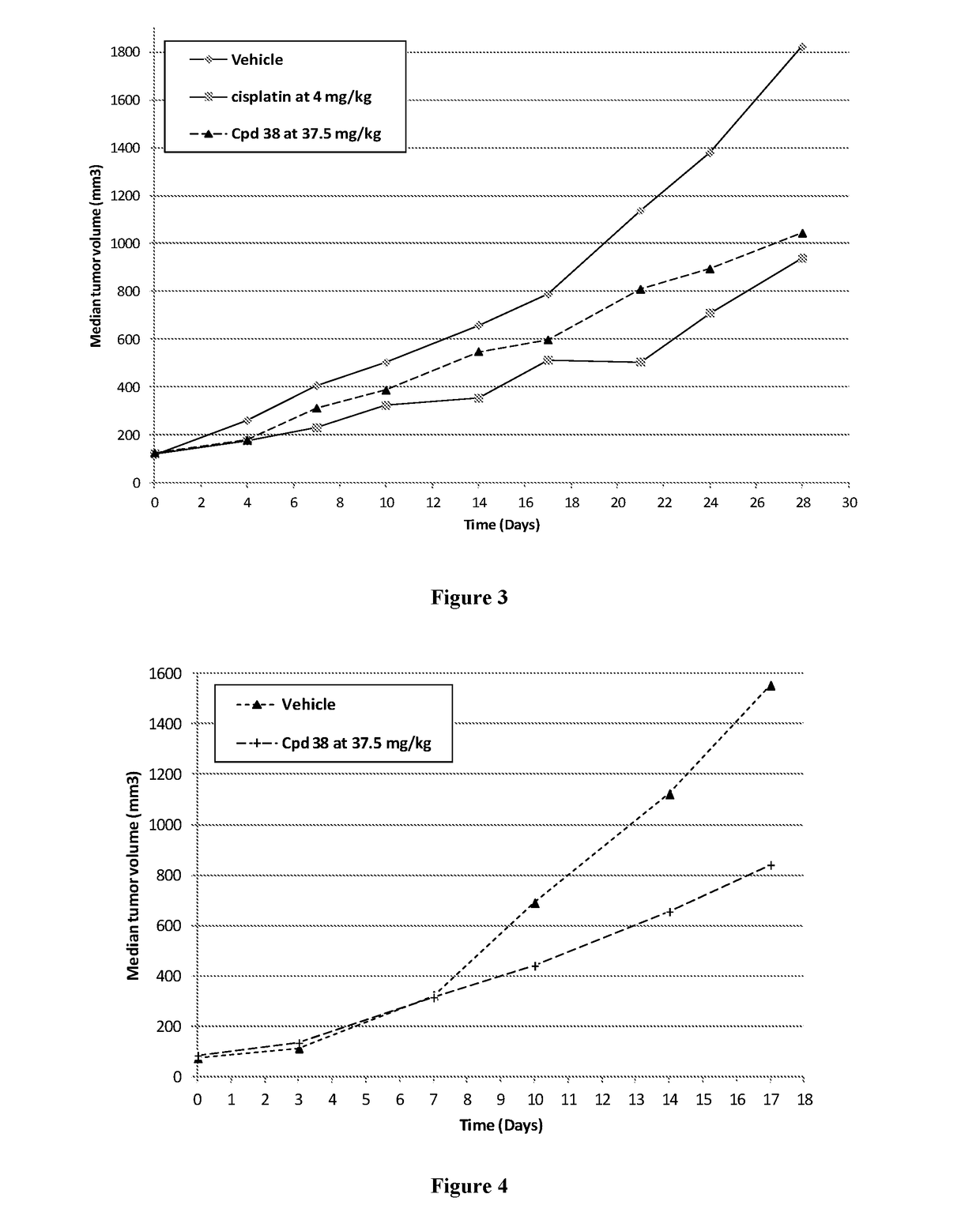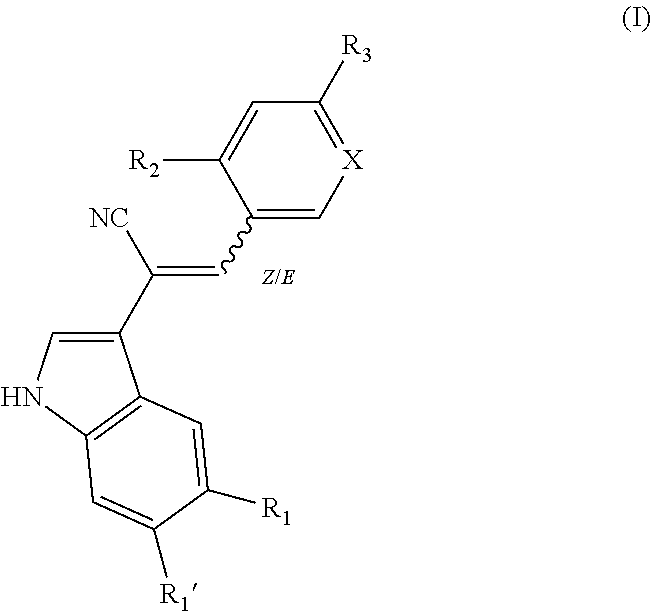New derivatives of indole for the treatment of cancer, viral infections and lung diseases
a technology of indole and derivatives, which is applied in the field of indole derivatives, can solve the problems of lack of potent inhibitors and inhibitors that do not show potential efficacy against mklp2
- Summary
- Abstract
- Description
- Claims
- Application Information
AI Technical Summary
Benefits of technology
Problems solved by technology
Method used
Image
Examples
example 1
on of Starting Indoles and Aldehydes
[0622]A) Syntheses of Starting Indoles
Tert-butyl-5-bromo-3-(cyanomethyl)-1H-indole-1-carboxylate
[0623]
[0624]In a 250 mL pear flask, 2-(5-bromo-1H-indol-3-yl)acetonitrile (1.76 g, 7.49 mmol) was dissolved in 70 mL of acetonitrile to give a colorless solution. Di-tert-butyl-dicarbonate (1.922 mL, 8.98 mmol) and DMAP (0.091 g, 0.749 mmol) were added to the solution and the reaction mixture was stirred at RT for 1 h.
[0625]TLC: 100% Dichloromethane showed no more starting material.
[0626]Then the reaction mixture was poured into 50 mL of water, extracted with 2× 50 mL of ethyl acetate and the combined organic layer was successively washed with 1× 50 mL of Brine, dried over Na2SO4, filtered and concentrated in vacuo to give a yellow oil which crystallized upon standing to give a yellow solid, m=2.59 g (Yield: 99%)
[0627]APCI-MS: (M−H)=234
[0628]1H NMR (300 MHz, DMSO-d6) δ ppm: 8.00 (d, J=8.8 Hz, 1H), 7.91 (d, J=1.8 Hz, 1H), 7.73 (s, 1H), 7.53 (dd, J=8.8, 2...
preparation of examples 2 to 53
Method A: Knoevenagel Condensation
[0719]
[0720]To a solution of cyanomethyl-indole-1-carboxylic acid tert-butyl ester (1 eq.) in THF was added sodium hydride (1.5 eq.) under an argon atmosphere. The reaction apparatus was protected from light and the mixture stirred at room temperature for 1 hour. Then the reaction mixture was cooled to 0° C. and the aldehyde (1.2 eq.) was added in portions.
The mixture was stirred at room temperature for 24 or 48 hours, then quenched with saturated ammonium chloride aqueous solution and extracted with AcOEt. The combined organic layers were dried over MgSO4 and evaporated under vacuo. When the desired compound protected with a Boc group remained as a side product of the reaction, the reaction mixture was treated with a solution of HCl in dioxane or an aqueous solution of NaOH 1N to complete the Boc deprotection. Then the crude residue was triturated with a minimum of solvent (MeOH or CH2Cl2 or Et2O), filtrated, washed with Et2O, and dried in vacuo fo...
example 2
(Z)-3-(4-ethoxypyridin-3-yl)-2-(5-methoxy-1H-indol-3-yl)acrylonitrile
[0728]
[0729]Method B:
[0730](Z)-2-(5-methoxy-1H-indol-3-yl)-3-(4-chloro-3-yl)acrylonitrile (50 mg), KOH (45 mg) and EtOH (1.5 mL). Trituration with AcOEt. Aspect of the pure product: yellow solid. (Yield: 67%).
[0731]ESI-MS: (M+H)+=320
[0732]1H NMR (Acetone-d6, 300 MHz) δ ppm: 9.05 (s, 1H), 8.47 (d, J=5.8 Hz, 1H), 7.81 (s, 1H), 7.75 (s, 1H), 7.49 (d, J=2.3 Hz, 1H), 7.47 (d, J=9.0 Hz, 1H), 7.11 (d J=5.8 Hz, 1H), 6.93 (dd, J=9.0 Hz, J=2.3 Hz, 1H), 4.40 (q, J=7.0 Hz, 1H), 3.88 (s, 3H), 1.49 (t, J=7.0 Hz, 1H).
PUM
 Login to View More
Login to View More Abstract
Description
Claims
Application Information
 Login to View More
Login to View More - R&D
- Intellectual Property
- Life Sciences
- Materials
- Tech Scout
- Unparalleled Data Quality
- Higher Quality Content
- 60% Fewer Hallucinations
Browse by: Latest US Patents, China's latest patents, Technical Efficacy Thesaurus, Application Domain, Technology Topic, Popular Technical Reports.
© 2025 PatSnap. All rights reserved.Legal|Privacy policy|Modern Slavery Act Transparency Statement|Sitemap|About US| Contact US: help@patsnap.com



